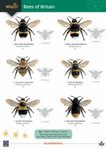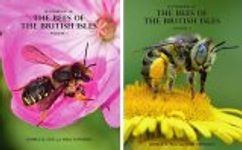By
Leon (NHBS Catalogue Editor)
15 Aug 2023
Written for Hardback

The collectives formed by social insects fascinate us, whether it is bees, ants, or termites. But it would be a mistake to think that the individuals making up such collectives are just mindless cogs in a bigger machine. It is entirely reasonable to ask, as pollination ecologist Stephen Buchmann does here,
What a Bee Knows. This book was published almost a year after Lars Chittka's
The Mind of a Bee, which I reviewed previously. I ended that review by asking what Buchmann could add to the subject. Actually, despite some unavoidable overlap, a fair amount.
Though I will leave a comparison and recommendation for the end of this review, I can already tell you that
What a Bee Knows is a different beast altogether. Buchmann's approach to convincing you that bees are sophisticated insects is to provide a general and wide-ranging introduction to bee biology, telling you of all the things they get up to.
What makes this introduction accessible to a broad audience is that Buchmann goes back to first principles. For starters, what even is a bee, and where did they come from? You might not realise that they evolved from carnivorous predatory wasps and likely did so some 130 million years ago, not long after the evolution of flowering plants. Another basic aspect Buchmann highlights is how myopically focused we are on social bees. The thing is, ~80% of all 20,000+ described bee species are solitary. Their biology is the more representative one and Buchmann discusses examples from their lonesome lives throughout this book, many based on his observations working in the Sonoran Desert of Arizona and elsewhere. He reminds the reader that "we should not think of honey bees as the pinnacle of bee evolution toward which all bee species strive" (p. 32). Theirs is the exception; a high-risk, high-reward strategy to making a living on this planet.
This approach of introducing basic concepts is applied throughout the book. Thus we get a brief tour of the gross anatomy of the bee brain, but not before Buchmann explains the basics of the human brain and the structure and workings of neurons. And an introduction to sexual selection prefixes the discussion on the many sexual escapades of bees: from scramble competition in cactus bees involving bee brawls (which is exactly what it sounds like), to hilltop lekking in carpenter bees, to alternative reproductive tactics with different male morphs in
Centris pallida. Bees can learn to solve problems, improve their performance, and even learn new tricks from other bees, but what is this process called learning and how widespread is it? Similarly, chapters on sleep, pain, and consciousness all first discuss more broadly what these are and what we know about them in humans and other vertebrate and invertebrate organisms.
Buchmann is a pollination ecologist by training and he cannot help but indulge in a long chapter on pollination. He is on form here and gleefully reminds readers that, next to billboards for pollinators, "flowers are unabashedly plant genitals exposed on a stem for all to see" (p. xiii), while bees act as "surrogate flying flower penises" (p. 78). Though it is traditionally held up as a wholesome form of mutualism, it has elements of an arms race too. As Jeff Ollerton also points out, active pollination, where a pollinator deliberately places pollen on a flower's stigma, is extremely rare. Rather, the norm is that both pollinators and flowers have their own interests (food and pollination), at heart first and foremost. Sometimes both parties will benefit, but this is not a given. Orchids trick male bees into pseudocopulation with flowers that look and smell just like female bees, dusting them in pollen in the process without offering any nectar. At the other extreme, carpenter bees have become nectar robbers, using their jaws to cut into flowers at their base to access nectar, and thus not providing pollination services. And here is an interesting recent development: studies on the bee microbiome suggest that bees derive some of the microbial life that populates their gut from the flowers on which they forage. In some cases, the proteins contributed by flower microbes might be more nutritious than the pollen grains.
A chapter on sensory biology is, of course, obligatory and Buchmann covers all relevant topics: the trichromatic vision of bees that extends into the ultraviolet, their perception of polarized light used in navigation, their excellent smell, their hearing (which is more a detection of pressure waves at close range), their taste and tactile senses, their to-us-alien detection of electrical charges (and the electrostatic footprints bees leave on flower petals after a visit), and the still contentious topic of magnetoreception. What was new to me is that the two mobile antennae produce a three-dimensional impression of an odour field, and some nifty experiments that involved crossing their antennae resulted in bees persistently walking away from the source of a smell, indicating that they really do smell in stereo.
Though an accessible and enjoyable romp into bee biology, I do have a few minor quibbles. There is a limited number of general black-and-white illustrations and photos, and the reproduction of the latter is so-so as this is a print-on-demand book. And though
What a Bee Knows avoids getting too technical, I do feel that in some places Buchmann wanders a bit off-piste from exploring the inner world of bees into more general fascinating tales of bee biology. Nevertheless, the book achieves its mission of instilling a renewed respect and a better understanding of how bees live.
Having now reviewed both Chittka's
The Mind of a Bee and Buchmann's
What a Bee Knows, how do they compare and which one should you read? Both books broadcast the same message loud and clear: bees are darn sophisticated creatures and even individually are far smarter and more capable than you might initially give them credit for. As mentioned, Buchmann goes back to first principles on many topics and wanders into bee biology more generally, while I remarked that Chittka delivers an information-dense book with numerous explanatory illustrations that is very focused in its approach, talking bees, bees, and the occasional other hymenopteran. Consequently, Buchmann does not delve as deeply into many subjects, though he does discuss some experiments in detail (including Chittka's work on several occasions). My recommendation would be that general readers with little background in biology or entomology pick, or first start with,
What a Bee Knows. Biologists, in particular entomologists, might want to skip straight to Chittka's
The Mind of a Bee and get stuck in the wealth of detail there.



































